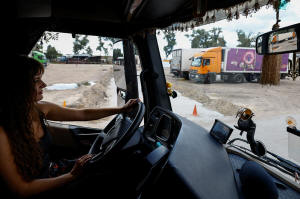Ukraine businesses hire more women and teens as labor shortages bite
 Send a link to a friend
Send a link to a friend
 [September 12, 2024] By
Olena Harmash [September 12, 2024] By
Olena Harmash
KYIV (Reuters) - After spending years in what she described as "boring,
sedentary" roles in the offices of several Ukrainian companies, Liliia
Shulha landed her dream job as a truck driver with Ukraine's leading
retailer, Fozzy Group.
"I always dreamed about big cars. Instead of (playing with) dolls, I
drove cars when I was a child," she told Reuters.
"Now the situation is such that they take people without experience and
they train. I was lucky," said Shulha, 40, wearing a company uniform in
front of a large truck.
As the war with Russia drains the labor force, businesses are trying to
cover critical shortages by hiring more women in traditionally
male-dominated roles and turning to teenagers, students and older
workers.
With millions of people, mostly women and children, abroad after fleeing
the war, and tens of thousands of men mobilized into the army, the jobs
crisis could endanger economic growth and a post-war recovery, analysts
say.
Ukraine has lost over a quarter of its workforce since Russia's invasion
in February 2022, central bank data showed.
Nearly 60% of businesses said finding skilled workers was their main
challenge, an economy ministry survey of over 3,000 companies showed.
"The situation is indeed critical," said Tetiana Petruk, chief
sustainability officer at steel company Metinvest, one of Ukraine's
largest employers with a workforce of about 45,000. It has about 4,000
vacancies.

"The staff deficit that we feel has an impact on our production," Petruk
told Reuters in an online interview.
"We are not the only ones who feel the staff shortages, all companies in
the regions feel that, including our contractors."
Reuters spoke to representatives of nine Ukrainian companies, from big
industrial firms to retail groups and small private entrepreneurs. All
said staff shortages and a growing mismatch of skills were big
challenges.
Businesses said they were changing recruitment and business practices,
automating, rotating existing staff and expanding their job
descriptions, re-hiring retirees and offering more benefits, especially
for younger workers.
They have also had to increase wages. The average monthly wage is now
about 20,000 hryvnias ($470) compared to about 14,500 a year ago.
"There is a noticeable shift away from gender and age bias in candidate
selection as employers adjust criteria to attract needed employees,"
said the Kyiv School of Economics. "This trend also extends to
entrepreneurship, where the share of female entrepreneurs is growing
significantly."
MORE WOMEN
Male-dominated industries are more affected by staff shortages, the
central bank said.
The construction sector, transport, mining and others have all suffered
because of military mobilisation, for which men aged 25 to 60 are
eligible. To keep the economy running, the government provides full or
partial deferrals for critical companies.
In the energy and weapons production sectors, 100% of staff are eligible
for draft deferral. In some other sectors, firms can retain 50% of male
staff. But the process to secure deferral is long and complicated.

[to top of second column] |

Driver Liliia Shulha drives her truck at a compound of a logistics
company, amid Russia's attack on Ukraine, in the village of
Trebukhiv, Kyiv region, Ukraine August 13, 2024. REUTERS/Valentyn
Ogirenko

As the government toughened mobilization rules this year, the number
of men preferring informal employment - allowing them to stay off
public data records - grew, some enterprises said.
In the agricultural southern region of Mykolayiv, women are being
trained as tractor drivers. Women are also increasingly working as
tram and truck drivers, coal miners, security guards and warehouse
workers, companies say.
"We are offering training and jobs for women who have minimal
experience," said Lyubov Ukrainets, human resources director at
Silpo, part of Fozzy Group.
Including Shulha, the company has six female truck drivers and is
more actively recruiting women for other jobs previously dominated
by men, including loaders, meat splitters, packers and security
guards.
The share of female employees is growing in industries such as steel
production. Petruk said female staff accounted for about 30-35% of
Metinvest's workforce and the company now hired women for some
underground jobs. Metinvest was unable to provide comparative
figures for before the war.
Some other women are unable or unwilling to join the workforce
because of a lack of childcare. Shulha, who works 15-day stretches
on the road, has moved back in with her parents to ensure care for
her 14-year-old son and 16-year-old daughter.
YOUNG PEOPLE
Businesses and economists expect labor market challenges to persist.
Employers are turning their attention to young people by offering
training, job experience and targeted benefit packages.
Metinvest, which previously focused on students, is now increasingly
working with professional colleges, Petruk said.
Silpo is more actively hiring teenagers for entry-level jobs in
supermarkets and has launched a specialized internship program for
students.
Mobile phone operator Vodafone repackaged its youth program,
creating an opportunity for about 50 teenagers in 12 cities to get
their first job experience.
"We want to offer the first proper experience of the official job to
this young audience. Another objective is to build a talent pool,"
said Ilona Voloshyna of Vodafone Retail.

"Also we want to understand the youth," she said in a Vodafone shop
in Kyiv as six teenagers consulted with visitors.
The government and foreign partners have launched several programs
to help Ukrainians reskill.
"We provide the opportunity for everyone at state expense to obtain
a new profession which is in demand on the labor market, or to raise
their professional level," said Tetiana Berezhna, a deputy economy
minister.
(Additional reporting by Yurii Kovalenko and Viktoriia Lakezina;
Editing by Mike Collett-White and Timothy Heritage)
[© 2024 Thomson Reuters. All rights
reserved.]
This material may not be published,
broadcast, rewritten or redistributed.
Thompson Reuters is solely responsible for this content. |